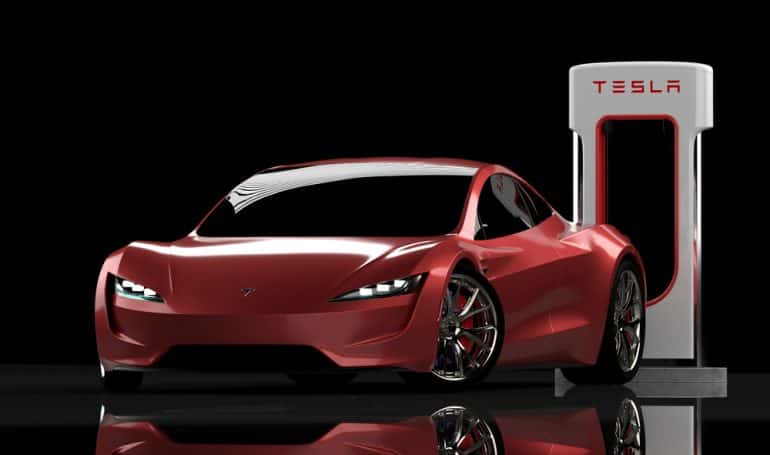Tesla (NASDAQ: TSLA) stock price is attempting to reverse its month-long downtrend that saw it decline to the lowest level since January 2023 on April 22. TSLA delivered a series of bad news in the leadup to declining to $138.80, starting with an announcement that it had initiated the laying off of 10% of its workers, followed by a recall of its iconic Cybertruck units and ending the week with substantial price cuts on its Modles X, Y and S. The stock price currently trades at $182.92, after gaining 14.4 percent in the last week of April.
The stock made significant gains, including an intraday rise of 15% on the back of news that CEO Elon Musk had helped navigate the company through China’s data sharing hurdles during his visit to China in the last week of April. The move is expected to open a pathway for a wider adoption of Tesla’s Full Self Drive (FSD) service, which it considers a key growth driver.
Tesla reported Q1 2024 revenues of $21.30 billion vs analysts’ forecast figure of $22.15 billion. That translated to a decline of 9% from the first quarter of 2023-and bigger than the Covid-19 era drop. The EPS stood at 45 cents per share against a consensus estimate of 51 cents. Furthermore, the profit stood at 1.13 billion versus $2.51 billion made in the first quarter of 2023, representing a decline of 55 percent. Nonetheless, Tesla share price rose in the week following the week following the earnings release.
Also, one of the key reasons behind the Tesla stock price recovery after the earnings report was the announcement that the comoany will also be focusing on producing sub-$30,000 units built around the Model 2. The move is expected to make Tesla more affordable to more users, hence enable it compete with Chinese rivals. Also,the company will be diversifying its market by producing robo-taxis, which will offer it a niche market where it could have an upper hand against its competitors. However, robo-taxis are not expected to come out of production lines over the next six years.
The recovery in the stock price signifies that investors still expect the company to have performed well despite the challenges it encountered during that period. Nonetheless, the stock is still 30% lower than its year-to-date high of $251. The EV giant finds itself in murky waters on stiff competition from Chinese companies, underlined by price wars and a generally tough business environment for electric vehicle manufacturers.
TSLA share price is still below 200-day SMA ($220) and could head lower if the bearish sentiment surrounding China’s EV market continues to grow. Tesla’s China rivals BYD, Xpeng and Nio reported better-than-expected deliveries in April, signifying a heated market. Xpeng’s deliveries in April rose by 4.1% from March to 9,393 EVs 4.1%, which is equivalent to a rise of 23% year-over-year. BYD delivered 313,215 units in April, a monthly growth of 3.6% and a year-over-year growth of 49%. Tesla does not release its monthly sales figures in China, but attributed its earnings decline to tightening competition in China.
The year 2024 is shaping up to be an annus horibilis for the EV industry, with high interest rates, high inflation rates and reduced margins. With China offering subsidies to its EV manufacturers, two US senators have called for restrictive measures to be taken against Chinese EVs in the US market. These measures, ranging from increased tariffs to outright bans, could however, be counterproductive for Tesla if China retaliates, as China is one of its key markets. Despite seeing its deliveries rise by 20% year-on-year, the automaker saw only a 1% rise in revenue. This was reflected in the decline in gross revenue by 23% year-on-year, to $4.4 billion.
Tesla Stock Latest News
Tesla CEO Elon Musk announced on X on April 30 that the company will be focusing on expanding its supercharger network, although at a slower rate. Musk said that, ultimately, the company aims to achieve 100% uptime. Also, the company made key changes in its management structure. In late April, the company announced the departure of two top executives, battery development chief Drew Baglino and vice president for public policy Rohan Patel. In addition, Rebecca Tinucci, senior director of Tesla’s supercharger efforts, and Daniel Ho, head of the new vehicles program left the company.
Tesla announced on April 19 that it was recalling all 3,878 cybertruck units sold so far on concerns regarding faulty accelerator pedals. The recall notice stated that the fault resulted from an unapproved change that introduced “unapproved change” that introduced a “lubricant” in the assembly process of the pads, making them susceptible to getting stuck if great force is applied on them. While no accident has occurred or been attributed to the accelerator pedal failure so far, the recall is a setback for Tesla, considering the iconic status achieved by the Cybertruck model.
Furthermore, Tesla also announced that it had slashed prices of its Model X, Model Y and Model S vehicles by $2,000. The price cuts will be effected in the US, China, Middle East, Africa and Germany, where the price cuts have been effected on the Model 3. However, vehicles were not the only products affected by the price cuts.
The company also announced that it has reduced the price tag on its Full Self Driving (FSD) software from $1,2000 to $8,000 for its US customers. Tesla has been constantly lowering its prices in different regions since the start of 2023. While this has improved the company’s sales, the profit margins have also taken a big hit.
Tesla will announce its Q1 2024 results on April 23rd, and that is expected to inject new volatility into the stock price.
In late March, Tesla announced the availability of Full Self Driving (FSD) Beta v12 , a software built with fully autonomous driving capabilities, including steering, accelerating and braking for other vehicles and pedestrians within its lane. Tesla CEO Elon Musk announced on March 26th that the company would offer its North American customers a free test on its FSD for a month. The announcement saw TSLA share climb more than 5% in the hours that followed, with more upside anticipated. According to Musk, the FSD has the potential to become one of Tesla’s leading revenue earners.
The software is prized at $12,000 a piece, but Tesla owners have the option of choosing a monthly subscription option ranging between $99-$199. The groundbreaking technology is touted for its safety-focused approach and the convenience it promises car owners. Furthermore, Musk has ordered that all prospective customers be offered demos on the software’s use.
The FSD v12 Beta had been on trial mode for a long period, with its deadlines pushed forward multiple times. Therefore, its official launch is likely to bring the mojo back to TSLA and could see shares rise significantly in the coming weeks.
Tesla Deliveries Forecasts
Tesla reported a quarterly decline of 8.5% in its first quarter 2024 after selling 387,000 units compared to 422,000 units in the first quarter of 2023. Nonetheless, that was still higher than any other EV maker. Tesla’s formidable rival, BYD, which had more deliveries than Tesla in the last quarter of 2023 sold 300,114 units in Q1 2024, or 77.6% of Tesla’s sales. Notably, however, BYD’s sales were up by 13% in that quarter, signaling growing competition for Tesla from the Chinese EV company.
Tesla Sales decline in the first quarter of 2024
Tesla sold 386,810 cars in the first quarter of 2024, an 8.5% decline from last year’s first quarter deliveries of 422,875. Furthermore, the sales figures in Q1 2024 missed analysts’ forecast of 457,000. The company reported that it produced 433,371 units during the quarter.
Tesla Price Cuts Terminated in 2024
In its efforts to boost sales, Tesla slashed car prices multiple times in 2023. Although the price cuts varied depending on the region, on average, Model S and Model X prices have been lowered by a few thousand dollars. The company also cut prices in China in Q4 of 2023. It slashed the price of Model 3 BY 13.5% to 229,900 yuan, while Model Y dropped by 10% to 259,900.
However, Elon Musk announced in mid April that the company was ditching its discount strategy on all its vehicle models, describing it as “complex and inneficient.” This is the first time since 2022 that the company will be operating without discounts.
The company expects to start selling sub-$25,000 vehicle in 2025, and this could boost its sales numbers substantially. However, while the price wars might attract more buyers, they may result in reduced profit margins in the near term.
Tesla Price War
Elon Musk’s electric car maker has also revised its prices in its two leading markets in recent times. In the United States, customers who trade in their old vehicle for a new Tesla by March 31 2024, will receive 5,000 free Supercharging miles. In February, the company offered a discount of $1,000 on its Model Y rear-wheel drive and Model Y Long Range.
In China, the company announced incentives worth about $4, 800 for customers buying existing stocks of Model 3 sedans and Model Y SUVs.
Another notable Tesla stock news was Bill Miller, a legendary investor is shorting Tesla. He warned that he would continue shorting the stock if it made more positive moves. His rationale was that Tesla was highly overvalued as it was valued at a higher valuation than the other five auto companies like General Motors, Ford, and Toyota.
What is the Tesla market cap?
The falling share prices have precipitated Tesla’s fall from the top 10 ranked companies globally by market capitalisation. The company has shed more than a third of its value in 2024 and this could create a negative sentiment around it. There are currently 3.17 billion total outstanding shares of Tesla in the market. Multiplying the current Tesla stock price of $155 with the total outstanding shares gives a Tesla market cap of $492 billion.
Elon Musk Tesla ownership
What is Elon Musk’s net worth?
According to Bloomberg, despite liquidating some of his stake in the EV maker in the past, Elon Musk still holds 172.6 million Tesla shares. This puts the tech billionaire’s Tesla stake at 17%. At the current price of Tesla stock, this amounts to $96 billion worth of stock.
The recent surge in Tesla market cap has once again made Elon Musk the richest man in the world. According to reports, Elon Musk currently owns 172.6 million shares of the company, which translates into a 17% stake in the company.
He also has billions of dollars in cash, which he made by selling his stock last year. Notably, he has an interest in SpaceX. Elon Musk’s net worth is estimated to be over $197.7 billion, making him the third richest person globally. He has also taken loans against his shares to acquire Twitter.
Musk Donates Tesla Shares
Elon Musk has recently disclosed a Tesla stock (NASDAQ: TSLA) donation that he made in 2022 to a charity. According to the latest filing to the US regulator, the tech billionaire donated $1.95 billion in Tesla stock to charity in 2022. However, the name of the charity recipient, who received around 11.6 million shares, hasn’t been revealed.
Recently, Tesla has taken a step back from its plans to produce batteries in Germany. Instead, the EV maker will carry out the same production at its US facility due to favorable tax incentives. The discarded German battery facility was to be founded in Brandenburg, Germany.
Tesla Share Price History
Tesla launched its initial public offering in 2010. When it went public, the Tesla stock price was trading at a split-adjusted rate of $5. Since then, the TSLA stock has jumped by more than 28,000%, making it one of the best performers in the market.
While the long-term performance of the TSLA share has been good, the journey to the top has not been smooth. As shown below, the stock declined by 38% within a few months in 2015. Similarly, it then dropped by 56% within a few months in 2019. At the time, Elon Musk even warned that he had the funds secure to take the company private.
Is Tesla a good investment?
Tesla is a highly divisive company. On the one hand, there are die-hard fans like Cathie Wood who believe that the company will do well and thrive in the future. On the other side, there are analysts and investors like Scotty Kilmer and Bill Miller who believe that the promised future of EVs is only a mirage. He believes that there will be no mass demand for the company.
From a fundamental perspective, Tesla is no longer a good investment because of its valuation and competition. The company is valued at over $350 billion while companies like Toyota and Volkswagen are valued at less than $200 billion each. GM and Ford are valued at less than $50 billion. Therefore, it is hard to justify the company’s valuation.
Further, the company is facing significant competition from incumbent companies like GM and Ford and upstarts like Rivian and Lucid. Rivian and Ford are its biggest threats because it has still not launched its truck product. Also, it is unclear whether the company’s truck will be successful since it seems like a relatively niche product.
Further, high interest rates will make Tesla’s products unaffordable even with the incentives in the Inflation Reduction Act.
On the other hand, proponents say that Tesla has a strong market share in the EV industry, a strong supercharger network, and a loyal fanbase.
Is Tesla profitable?
A few years ago, there were concerns that Tesla would never be a profitable company. This view has changed recently when the company started making strong profits. It has a net income margin of 10%, which is expected to grow as it boosts its scale.
Tesla turned its first profit in 2020 when it made $862 million in net profit. The figure rose to more than $5.5 billion in 2021 and over $11 billion in the past four straight quarters. Tesla made a net income of $3.3 billion in Q1 of 2022 followed by $2.5 billion and $3.2 billion in the next two quarters. Also, after a 75% drawdown in 2022, Tesla stock price rebounded strongly in 2023. Therefore, we could see a repeat of the same trend in the near future.
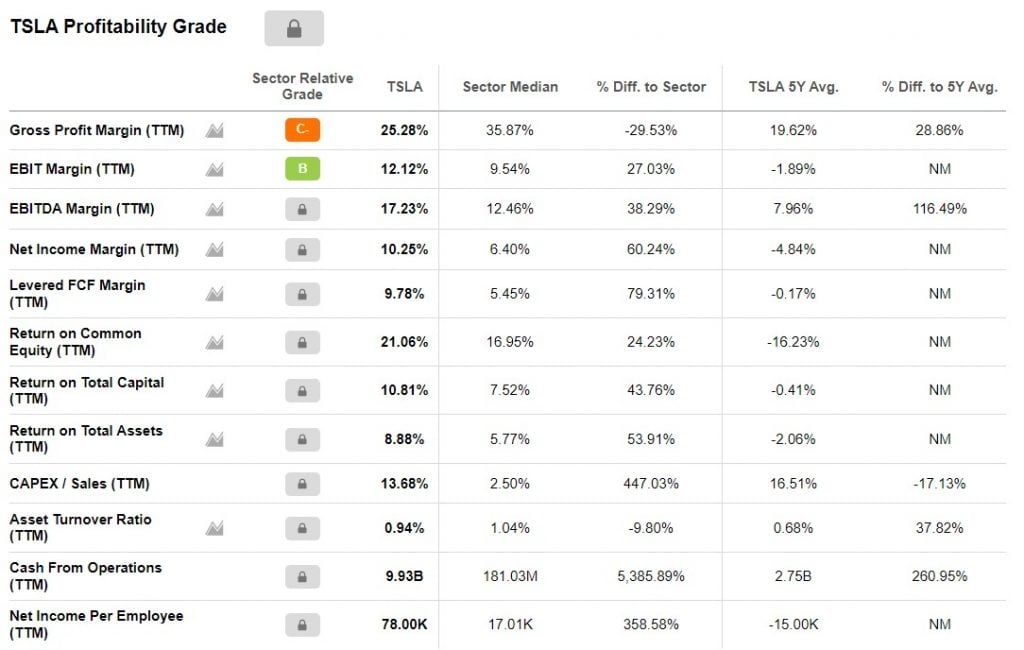
Is Tesla overvalued?
Most analysts believe that Tesla is an overvalued company. However, most of them justify this valuation because of its market share, revenue and unit growth, and upcoming projects including FSD and AI . According to a 12-month forecast by 32 analysts at tipranks.com, TSLA share price will likely be at an average of $171.99, with a high target of $310 and a low target of $22.89, signalling a substantial chance of volatility.
Tesla analysts forecast

Tesla Stock Price Prediction 2024
NASDAQ: TSLA formed a death cross in early February, and has broken below a critical support as at 161.70. Therefore a return above this mark will be critical to building momentum for the upside.
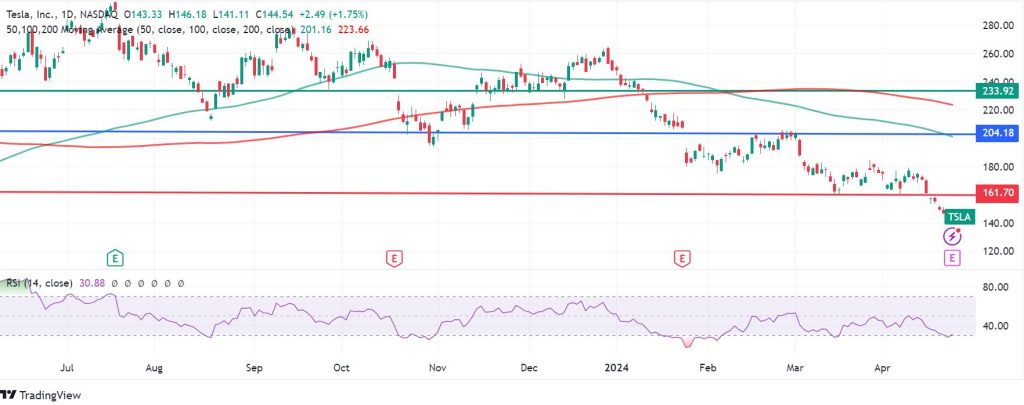
Due to a lower low on the weekly chart, Tesla stock price forecast doesn’t appear to be very bullish for the next couple of months. This may change if the bulls clear the supply zone which lies above $204. Until then, there will always be another chance for the bears to make a comeback.
US inflation rate and Fed interest rate decisions will be major factors affecting Tesla shares and other US equities over the next few months.
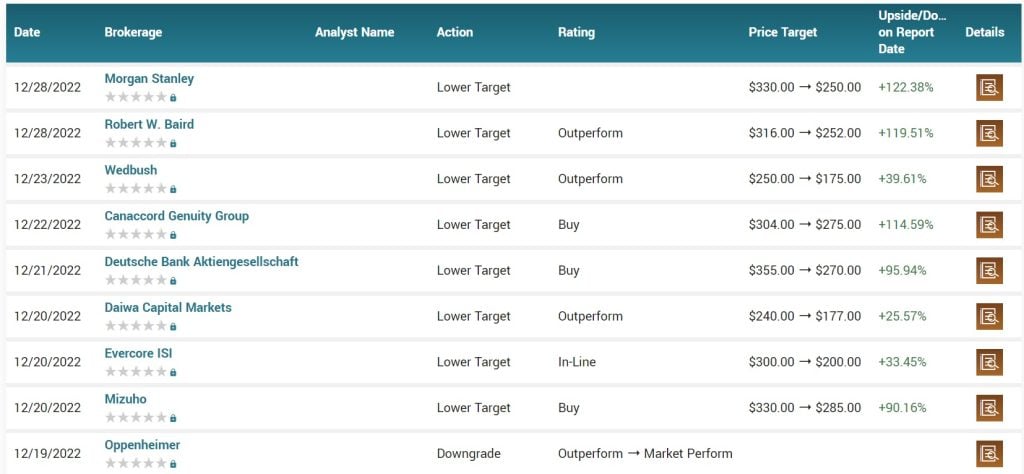
Tesla stock price prediction 2025 and 2030
I expect that TSLA shares will be significantly higher than where they are today by 2025 and 2030. At the time, the company will be highly profitable as the world moves to electric cars. As shown below, analysts at Wallet Investor expect that the stock will be trading at above $300 in 2025. Similarly, Cathie Wood believes that the stock will be over $3,000 by 2030. Ron Baron, who is a very successful fund manager, expects the TSLA stock price to hit $1500 by 2030.
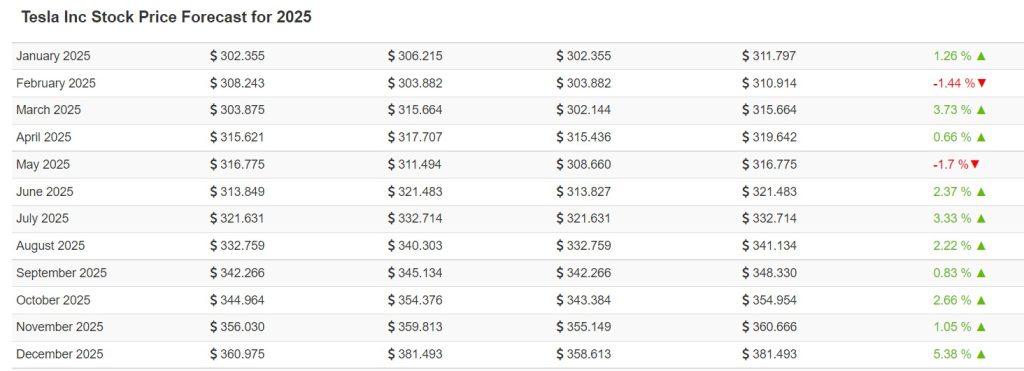
Tesla biggest shareholders
Tesla is a publicly traded company, meaning that anyone can buy the stock. As mentioned, Elon Musk owns about 17% of the company. At the same time, there are about 1,937 institutional investors who own 41% of the company. This means that retail investors own about 42% of the company. The biggest Tesla shareholders are Blackrock, Vanguard, Capital Group, and Baillie Gifford.

